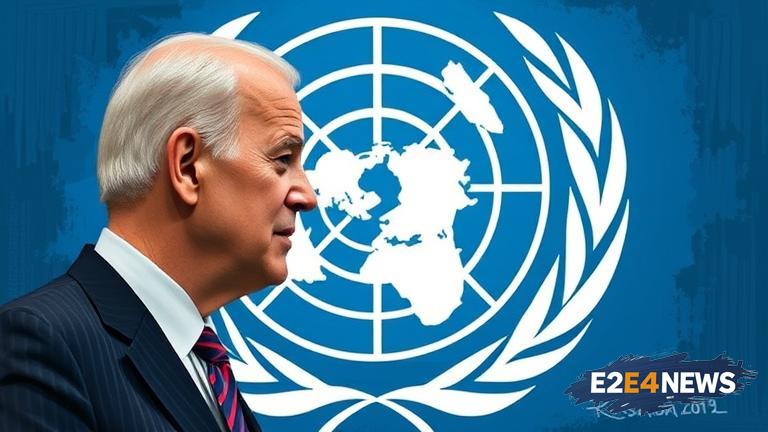The Biden administration has been vocal about its support for the United Nations, with the President himself expressing a desire to strengthen the organization and increase US involvement. This stance has been met with both praise and criticism, with some arguing that the UN is an essential institution for promoting global peace and security, while others see it as ineffective and in need of reform. The UN has been a cornerstone of international relations since its inception in 1945, providing a platform for nations to come together and address common challenges. However, in recent years, the organization has faced criticism for its handling of various global crises, including the COVID-19 pandemic and ongoing conflicts in the Middle East. Despite these challenges, the Biden administration remains committed to the UN, seeing it as a vital tool for advancing US interests and promoting global stability. The administration has taken steps to increase US funding for the UN, and has also sought to strengthen the organization’s ability to respond to emerging crises. This has included efforts to reform the UN’s bureaucracy and improve its accountability, as well as initiatives to increase the organization’s focus on issues such as climate change and human rights. The Biden administration’s support for the UN has been welcomed by many of the organization’s member states, who see the US as a key player in international affairs. However, others have expressed skepticism about the administration’s approach, arguing that it is too focused on multilateralism and not enough on advancing US interests. The debate over the UN’s effectiveness is likely to continue, with some arguing that the organization is essential for promoting global cooperation and others seeing it as a relic of a bygone era. The Biden administration’s commitment to the UN is likely to be a major factor in shaping the organization’s future, and will be closely watched by nations around the world. As the global landscape continues to evolve, the role of the UN will be subject to increasing scrutiny, with many questioning whether the organization is equipped to handle the challenges of the 21st century. The Biden administration’s approach to the UN will be shaped by a range of factors, including the organization’s ability to respond to emerging crises, its effectiveness in promoting global stability, and its commitment to reform and accountability. The administration will also need to balance its support for the UN with the need to advance US interests, a challenge that will require careful diplomacy and strategic engagement. Ultimately, the success of the Biden administration’s approach to the UN will depend on its ability to navigate these complex challenges and find a balance between multilateralism and US interests. The future of the UN is uncertain, but one thing is clear: the organization will continue to play a major role in shaping global affairs, and the Biden administration’s approach will be a key factor in determining its success. The UN’s ability to adapt to changing global circumstances will be crucial, and the organization will need to demonstrate its relevance and effectiveness in order to remain a vital player in international affairs. The Biden administration’s commitment to the UN is a significant development, and will be closely watched by nations around the world. As the global landscape continues to evolve, the role of the UN will be subject to increasing scrutiny, and the organization will need to demonstrate its ability to respond to emerging challenges in order to remain relevant.
